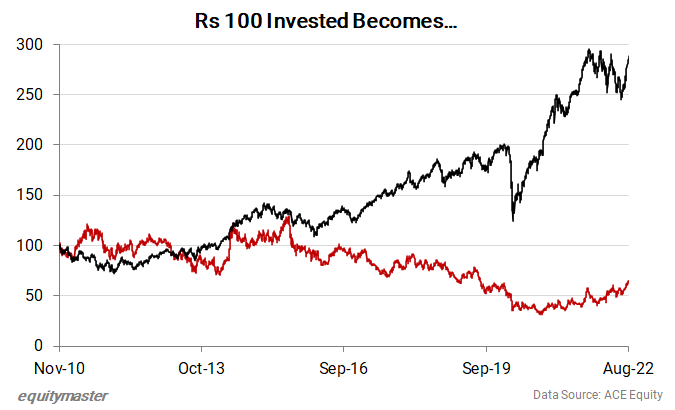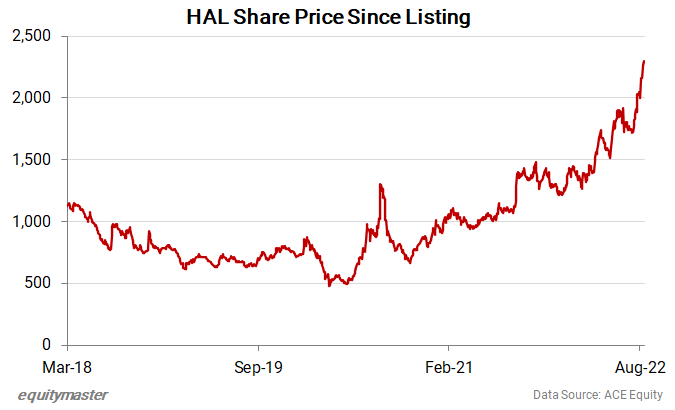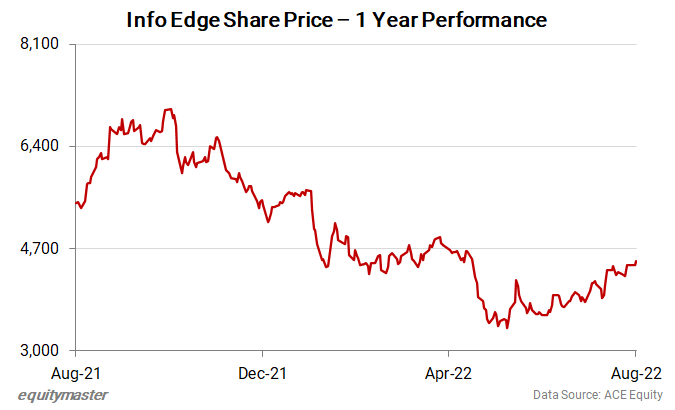- Home
- Views On News
- Aug 18, 2022 - 5 Stocks that Could Announce Big Buybacks in 2022
5 Stocks that Could Announce Big Buybacks in 2022

In financial year 2020-2021, share buybacks by companies climbed to a two-year high. As many as 61 companies offered to buy back shares worth Rs 392.9 bn.
This year in 2022, more than 25 companies have announced share buybacks.
In a buyback, the company purchases its own shares from the stock market. Subsequently, it cancels them or keeps them as treasury shares. The whole buyback process reduces the company's outstanding shares.
A buyback indicates the company has adequate cash to buy its own shares and is willing to reward its shareholders.
It also results in an improvement in financial ratios such as earnings per share, return on assets, and return on equity (ROE).
Apart from the above, buybacks make a lot of sense for companies now as they've become more tax efficient in India than dividends.
Keeping that in mind, here are five cash-rich companies which may announce buyback in financial year 2022-23.
This is not a confirmed list but a probable list of stocks which have zero debt on their books, have huge free cash flow, and some even have a history of declaring buybacks.
While dividend policies are fixed, buybacks are never guided. They depend on cash with the company.
#1 Coal India
First on our list we have Coal India.
If you're an investor in the state-run PSU, you probably know that Coal India has been among the most unloved stocks in recent years.
But not this time around. Share price of Coal India woke up from a prolonged period of underperformance in 2022.
Although, it still trades below the listing price.

Coal India lags behind capital appreciation, but it is a dividend paymaster, and is known for making big dividend payouts.
Despite India's renewable energy push, we believe Coal is here to stay. It forms a critical part of India's economy as the largest coal supplier to India's power sector.
Coming to why Coal India can announce a buyback...
In the past, Coal India has undertaken two buybacks, one in 2018 and another one in 2019. The company was exploring a buyback option last year too, but the plan was shelved because of capex. Coal India revised its capex target and scaled up its budget by an additional Rs 30 bn.
During the most recent June 2022 quarter, Coal India raised its capital expenditure by 64.8% to Rs 30.3 bn. This is driven by spending to acquire land and strengthen transport infrastructure in its coalfields.
In financial year 2021-22, Coal India reported cash and bank balance of Rs 291.7 bn and total debt of Rs 33.1 bn. With cash lying on the books even after funding for capex and debt, Coal India could announce a buyback in financial year 2022-23.
In another scenario, it could opt to pay dividend instead of going the buyback route or opt for an offer for sale (OFS).
For financial year 2021-22, Coal India paid dividend of Rs 17 per share which results in a dividend yield of around 10%.
To know more, check out Coal India's 2021-22 annual report analysis.
#2 Infosys
TCS already announced a buyback. In January this year, TCS announced its biggest share buyback of Rs 180 bn at Rs 4,500 per share.
A company can announce buyback once a year, so TCS is out of the list. That leaves us with Infosys.
Like TCS, Infosys has a rich history of buybacks. In 2017, Infosys had its first share buyback where the company bought a total of Rs 130 bn worth of shares.
Infosys had its second buyback in 2019, where the company bought back Rs 82.6 bn worth of shares. The third buyback was conducted in 2021.
2022 could be the year it announces its fourth buyback. Its executives have already made this public. India's top IT companies use dividends and share buyback to return money to their shareholders.
In an interview, Infosys chief executive Salil Parekh said the company was committed to returning a share of free cash flow to shareholders via a combination of dividends and buybacks.
As of March 2022, Infosys has a cash and bank balance of Rs 174.7 bn and free cash flow of Rs 220.4 bn.
In 2022, Infosys paid total dividend of Rs 31 per share as against Rs 27 per share for 2021.
IT companies usually have huge amounts of cash and they reward shareholders by buybacks. So don't be surprised if Infosys comes out with its buyback soon.
#3 Hindustan Aeronautics
Next on our list we have a defence PSU company Hindustan Aeronautics (HAL).
Hindustan Aeronautics manufactures and maintains aircraft and helicopters for the Indian Airforce, Indian Army, ISRO, Indian Navy, and Indian Coast Guard, among others.
It's a debt-free company with a strong order book, and a defence stock with good growth prospects.
Last month, it was reported that India's Department of Investment and Public Asset Management (DIPAM) was mulling buybacks in defence PSUs including HAL.
Earlier, HAL conducted a buyback in 2016 where the government garnered around Rs 45 bn. The company again came out with its buyback in 2018 where the government collected another Rs 11.3 bn.
As of March 2022, HAL has cash and bank balance of Rs 143.5 bn and free cash flow of Rs 59 bn. The company's debt is negligible at Rs 468 m.
DIPAM is currently weighing the capex plans and dividends of defence PSUs including HAL and then it will decide on buybacks.
Note that defence stocks have been on fire in 2022 and HAL is taking the charge in leading the rally. It continues to rise in falling markets and is presently trading at its all-time high level.

It appears that there's nothing but blue skies ahead for HAL.
To know more, check out HAL 2021-22 annual report analysis.
#4 Bharat Electronics
Another defence PSU that can announce a buyback is Bharat Electronics.
Bharat Electronics manufactures electronic equipment for the Indian defence forces. The company also diversified into non-defence products and software.
It has a reputed customer base that includes DRDO, ISRO, Railways, and All India Radio.
In the past, Bharat Electronics has conducted two buybacks. First one in September 2016 and the next one in February 2018.
With government focusing on defence PSU for buybacks and dividends, Bharat Electronics may be a contender as it has sufficient cash on its books.
As of March 2022, Bharat Electronics has cash and bank balance of Rs 75.6 bn and free cash flow of Rs 37.4 bn. The company has zero debt on its books so there's no debt obligations to take care of.
Bharat Electronics is a fundamentally strong company with good return ratios, zero-debt and strong debt coverage metrics.
To know more, check out Bharat Electronics financial factsheet and its latest quarterly results.
#5 Info Edge (India)
Last on our list is Info Edge (India).
Info Edge (India) is an Indian pure-play internet company, based in Noida.
The company runs the online job portal naukri.com, matrimony website jeevansathi.com, real estate classifieds platform 99acres.com and educational website shiksha.com.
The company has not announced any buyback in its history. Here's why this could change...
As of March 2022, Info Edge has free cash flow of Rs 109.3 bn and cash and bank balance of Rs 3.7 bn. The company has no obligations to take care of as it has negligible debt on its books.
For financial year 2021-22, the company paid dividend of Rs 13 per share, which was also its biggest dividend payout. What makes the option of buyback for Info Edge more appealing is that the stock is beaten down this year.
The Indian IT industry is going through a tough phase in 2022. In addition to the global tech selloff, the excess cash on the balance sheet of IT companies is resulting in falling return ratios.

Promoters also opt for buybacks when the company's share price has fallen a lot even if it has no flaw in its fundamentals.
IT companies are already eyeing buybacks to return cash to shareholders and Info Edge may also opt for a buyback if it does not pay big dividends.
In conclusion
Retail investors have mixed views when it comes to buybacks. And we agree.
Some investors might opt to tender their shares in a buyback as the offer is made at a higher price than the current price.
No doubt, tendering a part of your shares in a buyback could be a tempting proposition.
However, long term investors focus on the company's moat and the underlying fundamentals.
It's important to understand that buybacks reduce the number of outstanding shares. Thus, the shareholders who don't tender their shares end up with a bigger piece of the pie.
Doing nothing during a buyback may not be satisfying to many investors. Receiving cash may seem to be a better option.
However, if you invest in stocks for the long term, buybacks will increase the value of your existing shares.
The reduced number of outstanding shares will boost per share earnings as well as the return on equity (ROE). And in the long run, these two measures matter more than anything else. Do keep this in mind.
Before signing off, we recommend you check out the below video where Richa Agarwal talks about buybacks and the 14 stocks to keep on your watchlist.
According to Richa, tracking buybacks could give you great insights in nailing down future multibagger stocks.
Happy Investing!
Disclaimer: This article is for information purposes only. It is not a stock recommendation and should not be treated as such. Learn more about our recommendation services here...
FAQs
1) What is a buyback?
Buyback of shares is a process where a company buys back its own shares from investors.
The result of the whole buyback process is that the number of shares outstanding for the company is brought down.
After the company purchases its own shares, it often cancels them or keeps them as treasury shares. Treasury shares are the shares that may have come from a buyback or may have never been issued to the public in the first place.
2) Why do companies opt for buyback?
A primary reason companies opt for buyback is because they have too much cash on their books and very low investment.
Another reason for conducting a buyback is to improve valuations. When a company buys back shares, it results in reduction of the number of shares outstanding. In result, this improves the earnings per share (EPS) and return on equity.
Buybacks are also a more tax-effective form for rewarding shareholders rather than dividends.
3) What should investors do when companies opt for buyback?
Investors can tender their shares in a buyback if the offer is made at a much higher price than the current price. This becomes a tempting proposition.
However, long term investors should focus on the company's moat and the underlying fundamentals.
Since buybacks interest you, check out this video where we list out 14 stocks to keep in your watchlist.

Yash Vora is a financial writer with the Microcap Millionaires team at Equitymaster. He has followed the stock markets right from his early college days. So, Yash has a keen eye for the big market movers. His clear and crisp writeups offer sharp insights on market moving stocks, fund flows, economic data and IPOs. When not looking at stocks, Yash loves a game of table tennis or chess.


Equitymaster requests your view! Post a comment on "5 Stocks that Could Announce Big Buybacks in 2022". Click here!
Comments are moderated by Equitymaster, in accordance with the Terms of Use, and may not appear
on this article until they have been reviewed and deemed appropriate for posting.
In the meantime, you may want to share this article with your friends!